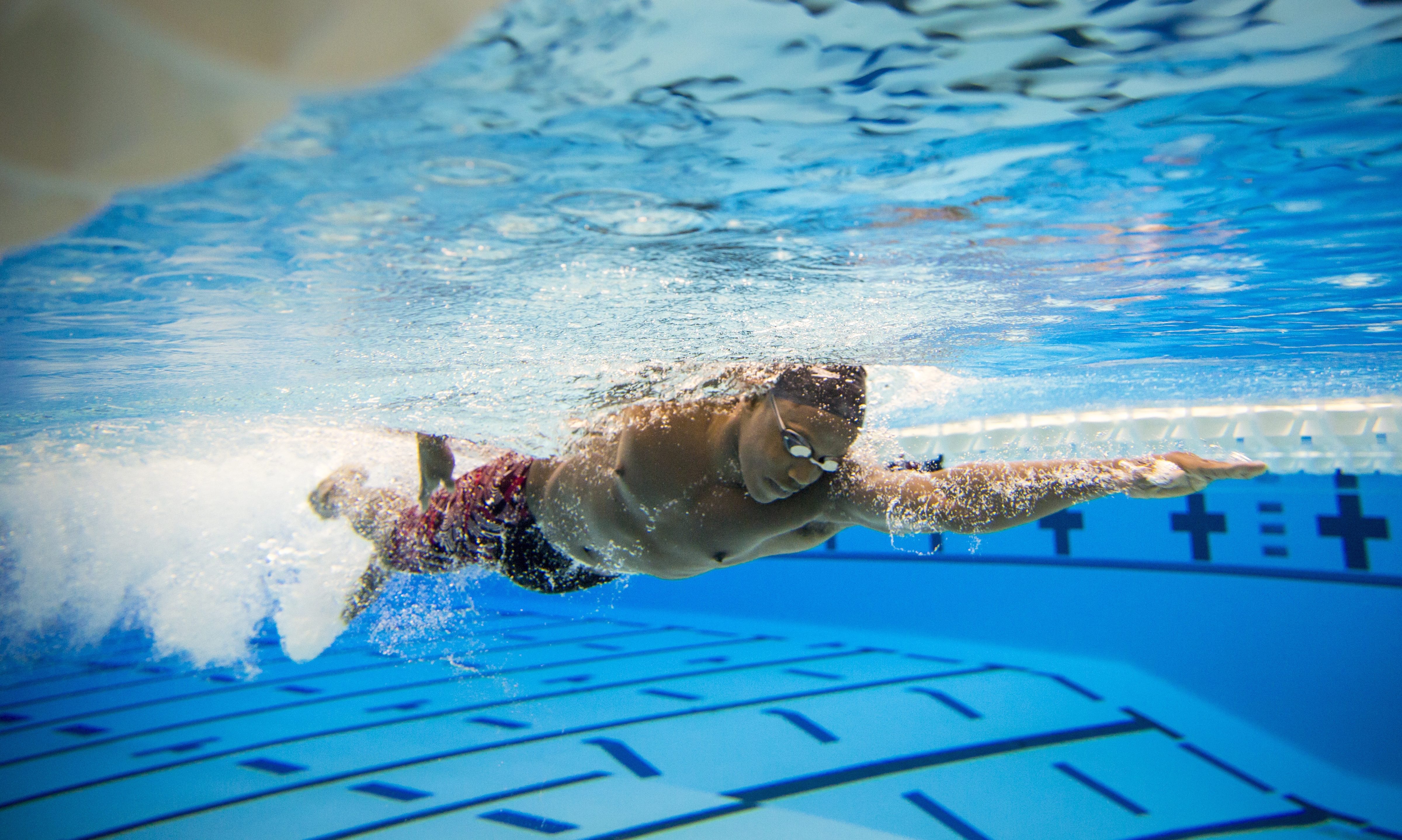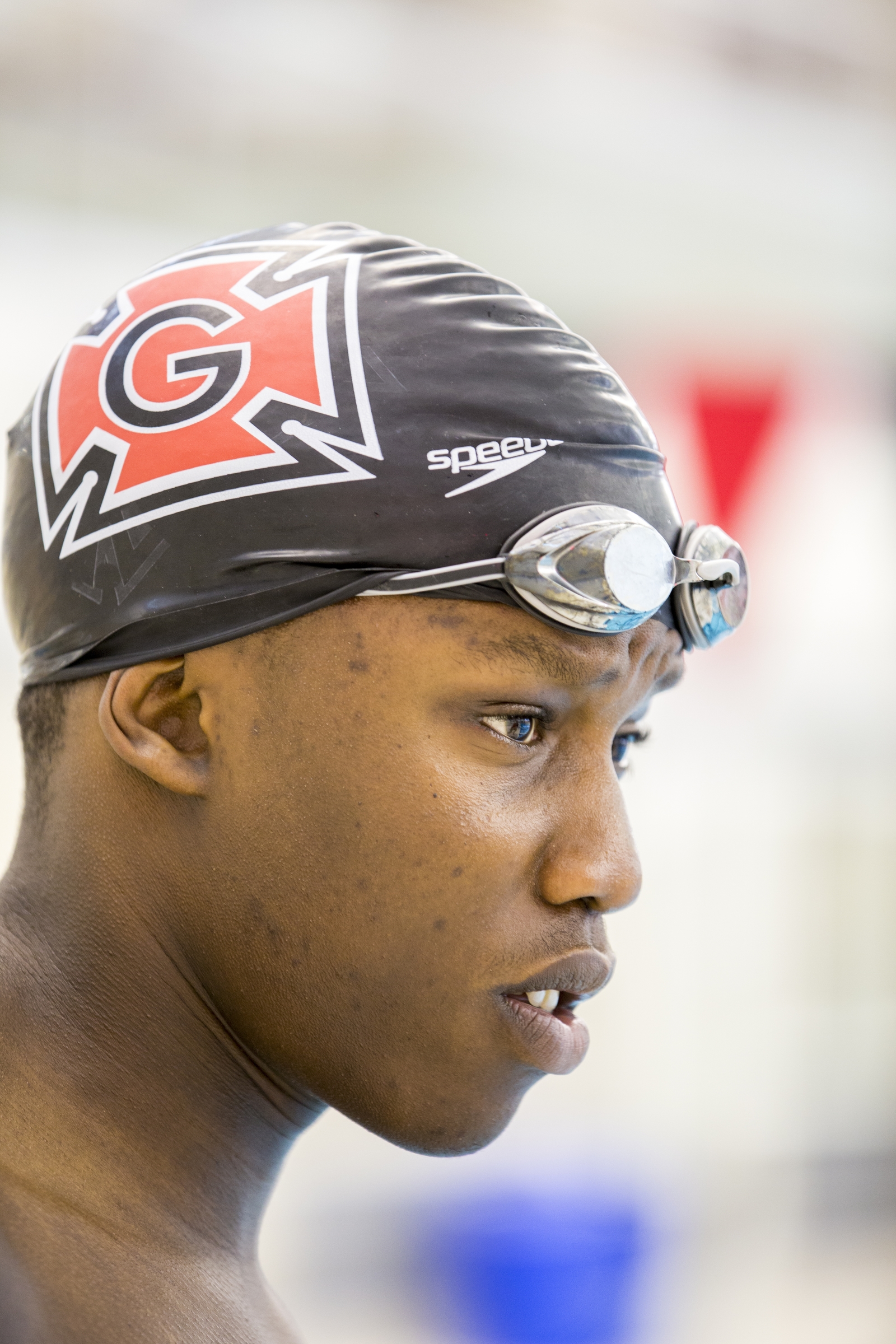
Even though classes are almost over, and finals loom on the horizon, Grinnell College first-year student Joshua Tibatemwa still trains six days a week. The intense practices help Tibatemwa, 19, prepare for the opportunity to represent his native Uganda in the 2016 Summer Olympics in Rio de Janeiro, Brazil.
As Uganda's overall fastest male swimmer, Tibatemwa has been named a finalist for that country’s Olympic swim team by the Ugandan Swimming Federation. The federation is expected soon to announce who will be the male and female swimmers competing for their country in the Rio Games, which run August 5–21.
Last August, at the International Swimming Federation World Championships in Kazan, Russia, Tibatemwa set two national records for Uganda and achieved his personal best in the 50 freestyle (25.54 seconds) and 50 breaststroke (33.00 seconds). If he swims in the Olympics, he’ll compete only in the 50 free.
Swimming is a relatively new sport in Uganda, and the level of competition pales to the international champion threshold — the overall men's world record in the 50 free is 20.26; 25.25 in the 50 breaststroke. Tibatemwa is aware of the gulf.
"I am part of the second generation of competitive swimmers in Uganda," he says. "In 10 to 20 years, I hope we will see Uganda swimming on a par with USA swimming."
He strives to close the gap with hard work. Under the guidance of Grinnell swim coaches Tim Hammond and Erin Hurley, Tibatemwa, who swims on Grinnell's varsity, practices in the water one to two hours per day, Monday through Saturday. He also does up to an hour of daily strength training.
"It's the best training I have ever gotten," Tibatemwa says. "It is very structured and will help me if I get to the Olympics.
Several seniors on the swim team often practice with Tibatemwa, so he can gauge his speed against other swimmers. "I find it easier to train while competing against them rather than competing just with the time on the clock," he says.
Tibatemwa has thoroughly impressed his coaches with his drive.
"It seems just his nature to want to be better," Hammond says. "He is eager to understand technique and accept critique day after day."
Hammond notes that Tibatemwa has good technique to excel on the world stage, with great reach in the front end of his stroke and a good hold on the water. "Once he has that hold, he can apply the incredible strength he has to it, and this produces an incredible distance per stroke," says the coach, who is focusing on increasing Tibatemwa's stroke rate.
Because Tibatemwa was training outside the regular college swim season, which ended in March, Hammond and Hurley couldn't coach Tibatemwa until they received a waiver from the NCAA. Until then they could only supply him with written workouts.
"It took us a few weeks to get the appropriate information from the NCAA and Uganda to put it all together," recalls Hammond, who provides the Ugandan federation with weekly updates. The federation also named Hammond and Hurley Ugandan National Swimming Coaches.
When they were able to work with Tibatemwa, they were more than pleased.
"Joshua is an absolute joy to coach," Hammond says. "He is perpetually positive and does his best to accomplish each task at hand. Most everyone sees Joshua as a shy, kind person. And he is, but when you spend enough time with Joshua in a competitive endeavor, you can start to peak at the competitive monster inside of him that one would never see without knowing him well enough."
Tibatemwa began swimming at age 6 in his hometown, Kampala, the Ugandan capital. "At first I didn't want to compete," he says. But by the time he was 13, he started to enjoy the sport. "With swimming," he says, "you have time to yourself as compared to other sports. You don't have to shout to pass the ball. You can be alone in your head."
On the advice of two of his mentors in school and in the Dolphins Swim Club Kampala — brothers Tefiro and Ham Serunjogi, Tibatemwa came to Grinnell last fall. He was looking for a school that had both good academics and swimming training. "Tefiro and Ham recommended Grinnell," he says of the duo, who each swam on the men's varsity while earning their degrees (Tefiro in 2011 and Ham, a senior, later this month). "So I trusted them and followed them here."
Though he calls the cold winter of east-central Iowa the biggest adjustment he's had to make, "The college is great, and I like being in a comfortable small town," he says. Referring to his hometown, with a population of 1.3 million, he adds, "It's nice to have a break from the big city."
When the spring semester ends on May 20, Tibatemwa, who plans to major in computer science, is scheduled to return to Kampala to continue his training and start an internship with Kiira Motors, the first manufacturer of solar-powered vehicles in East Africa.
 "I will train in the mornings and evenings, and do my work as an intern during the middle of the day," he says. "I'm hoping to develop software and gain experience in tackling real-world problems."
"I will train in the mornings and evenings, and do my work as an intern during the middle of the day," he says. "I'm hoping to develop software and gain experience in tackling real-world problems."
Following the internship, Tibatemwa hopes to fulfill a longtime ambition. But for now, the toughness of his training is matched only by how hard it is to wait for the federation's announcement.
"It has been a silent goal of mine to get to the Olympics," Tibatemwa says. "Every swimmer harbors it. I would love to have the opportunity to be among the world's best athletes, doing what they've been training to do for many years."
